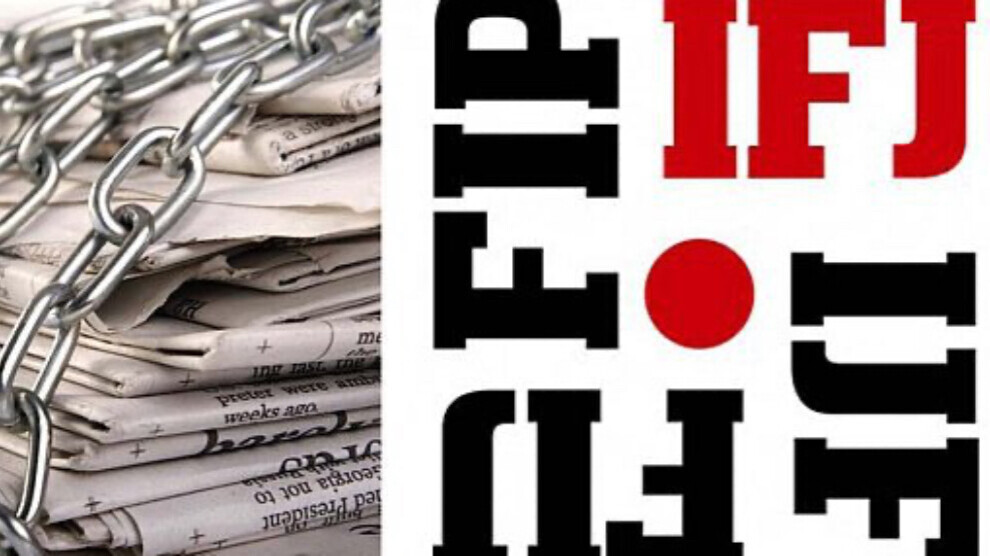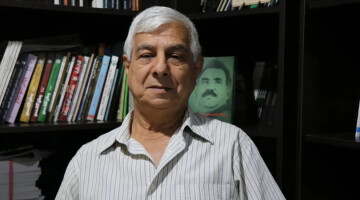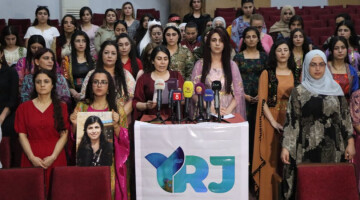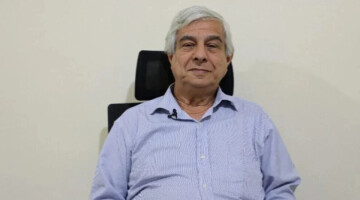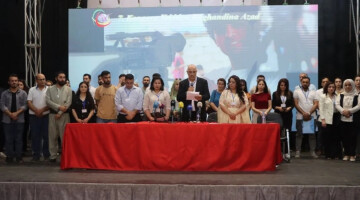International press freedom, freedom of expression, human rights, and journalists’ organisations, and media outlets, expressed serious concern over the recent escalation of press freedom violations in Turkey, marking a troubling start to the new year. The organisations pointed out that the frequent use of arbitrary arrests, detentions, judicial control measures, and convictions poses an existential threat to independent media, democratic discourse, and fundamental human rights in the country.
According to international organisations, Turkey must ensure that its practices align with international standards for the protection of freedom of expression and press freedom, as well as with the protections enshrined in its own constitution, in order to safeguard the foundations of democracy and human rights.
In January 2025 alone, at least nine journalists were arrested, six were sentenced to prison, five were detained, 23 faced investigations and one encountered police obstruction. Here is a timeline of a concerning acceleration of press freedom violations over the last month:
- On January 2, authorities launched an investigation against journalist Aslıhan Gençay for her reporting on corruption in Hatay. They blocked access to her article and charged her with multiple offenses, including violations of the disinformation law—an apparent attempt to suppress investigative journalism.
- On January 7, the Ankara Chief Public Prosecutor’s Office launched an investigation against 21 journalistswho covered the Kobani trial’s final hearing. The journalists face potential fines for alleged unauthorized photography—a move that effectively criminalizes routine court reporting.
- On January 17, a coordinated crackdown led to the detention of six journalists – Reyhan Hacıoğlu, Necla Demir, Rahime Karvar, Vedat Örüç, Velat Ekin and Ahmet Güneş – across multiple cities. They were denied basic legal rights, including access to legal representation, and were subsequently arrested on January 20 without their statements being recorded. The authorities’ only justification appears to be their legitimate journalistic activities. (Note: Ahmet Güneş was released on February 4.)
- On January 21, Rudaw TV correspondent Rawin Sterk Yıldız faced police interference while documenting a detention in Istanbul’s Beyoğlu district. Despite clearly identifying himself as a journalist, he was prevented from documenting the public incident.
- On January 23, a troubling verdict resulted in five journalists – Yakup Çetin, Ahmet Memiş, Cemal Azmi Kalyoncu, Ünal Tanık, Yetkin Yıldız, Gökçe Fırat Çulhaoğlu – receiving harsh sentences—ranging from 25 months to over six years in prison—in a terrorism-related case, despite the absence of credible evidence.
- On January 24, the arrest of journalist Eylem Babayiğit once again demonstrated the arbitrary use of “membership of an organization” charges.
- On January 28, the detention of journalists Barış Pehlivan, Seda Selek, and Serhan Asker following their broadcast of a recorded phone conversation with an expert witness raises concerns about limitations on the coverage of matters of public interest. The court released Seda Selek and Serhan Asker under judicial control measures.
- On January 28, the launch of an investigation into T24 columnist Şirin Payzın for alleged “terror propaganda” over social media posts indicates a concerning expansion of surveillance and criminalization of online expression.
- On January 28, the conviction of journalist Safiye Alagaş, former news editor for the pro-Kurdish JINNEWS, resulted in a six years and three months prison sentence. Alagaş has already spent a year in pretrial detention and is currently free while awaiting appeal.
- On January 29, Halk TV editor-in-chief Suat Toktaş, program coordinator Kürşad Oğuz, and journalist Barış Pehlivan were detained for broadcasting a recorded phone conversation with an expert witness. While Pehlivan and Oğuz were released under judicial control measures, Toktaş was arrested—authorities cited flight risk and potential evidence tampering, demonstrating a concerning use of arbitrary detention criteria. Halk TV, one of Turkey’s largest private TV channels, is recognized for its critical programming.
Broadcast regulator’s decisions threaten press freedom
Turkey’s broadcast regulator RTÜK has demonstrated a concerning pattern of targeting critical media outlets. Just before the journalists’ detention over broadcasting a recorded phone conversation, the RTÜK Chair warned of potential consequences for media outlets and journalists regarding the same broadcast—effectively signaling the impending crackdown. In his statement, he criticized Halk TV for recording and broadcasting a phone conversation with an expert witness without permission and allegedly attempting to influence ongoing legal proceedings.
This incident reflects a broader pattern of regulatory pressure on critical media. In 2024, RTÜK imposed 24 broadcast bans resulting in fines totaling 81.5 million Turkish lira (approximately €2.2 million or $2.3 million), with the majority targeting media critical of the government.
The systematic use of regulatory powers to penalize critical media outlets raises serious concerns about the independence of broadcast regulation and its impact on media pluralism in Turkey.
In a recent example, following the devastating hotel fire in Bolu that erupted in the early morning hours of January 20, 2025, claiming 78 lives, the RTÜK Chair directed media outlets to report solely on information from official sources. Shortly after this directive, the Bolu 2nd Criminal Court of Peace imposed a broadcasting ban on coverage of the disaster at the request of the Bolu Chief Public Prosecutor’s Office.
Judicial control measures: a new tool for censorship
While there appears to be a decrease in the number of journalists in prison, this masks a troubling shift toward using judicial control measures—such as travel bans, regular check-ins at police stations, and house arrest—as alternative means of restricting press freedom. This trend represents an equally antidemocratic practice aimed at controlling journalists’ freedom of movement and expression. The systematic implementation of these measures, combined with increasing online censorship, appears to be replacing traditional detention as a method of silencing independent journalism.
Recent cases exemplify this pattern. While journalists are released under judicial control measures shortly after being detained, the arbitrary imposition of travel bans, house arrests and other restrictions continues to impede their ability to perform their professional duties effectively. These measures, originally intended as exceptional remedies to ensure judicial proceedings, are increasingly being weaponized to create a chilling effect on press freedom.
In light of these egregious violations of press freedom in Turkey, we urge the Turkish authorities to uphold the principles of justice, release the journalists subjected to arbitrary arrests and detentions, and safeguard the vital role of journalism in fostering debate on matters of public interest and democracy.
Signed:
International Press Institute (IPI)
Association of European Journalists (International)
Association of European Journalists in Belgium (AEJ Belgium)
Association of European Journalists in Bulgaria (AEJ Bulgaria)
Association of Journalists (GC)
Bulgarian Helsinki Committee
Catalan PEN
Center for Media, Information and Social Research of Georgia (CMIS)
Coalition For Women In Journalism (CFWIJ)
Danish PEN
European Centre for Press and Media Freedom (ECPMF)
European Federation of Journalists (EFJ)
Freedom House
Foreign Media Association (FMA Turkey)
Georgian Charter of Journalistic Ethics
IFEX
Index on Censorship
International Federation of Journalists (IFJ)
Irish PEN/PEN na hEireann
Kurdish PEN
Media and Law Studies Association (MLSA)
Media and Migration Association (MMA)
Media Development Foundation (MDF)
Netgazeti / Batumelebi
OC Media
P24 Platform for Independent Journalism
Armãn PEN
PEN America
PEN Centre of Bosnia & Herzegovina
PEN Esperanto
PEN International
PEN Melbourne
PEN Norway
PEN Québec
PEN Sweden
PEN Türkiye
Progressive Journalists Association (PJA)
San Miguel PEN
South East Europe Media Organisation (SEEMO)
Vietnamese Abroad PEN Centre
Yapay Gündem
The statement was produced as part of the Media Freedom Rapid Response (MFRR), a Europe-wide mechanism which tracks, monitors and responds to violations of press and media freedom in EU Member States and candidate countries.

